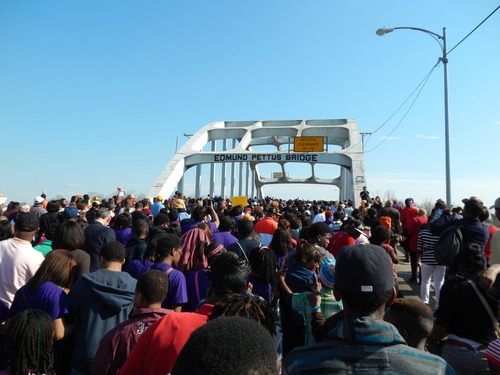
By Taroue Brooks
How did you get involved with the Annual Commemoration of Bloody Sunday and the Selma to Montgomery March?
I am a child of Selma and started doing volunteer work at the age of 18 for the founders of the Bridge Crossing Jubilee, Faya Rose Touré and her husband State Senator Hank Sanders. They introduced me to the world of community “activism” and sparked the fire of social justice and the importance of giving back. Community grass roots organizing, which included campaign and GOTV work in the summers and holidays became a way of life – a personal responsibility. Leadership and service became second nature. Throughout college, moving to Birmingham Al, starting a family and a career in hospitality for over 30 years I continued my work and obligation to the legacy of Selma, the Jubilee and other organizations committed to the uplifting of black communities; always mindful of those who sacrificed their lives in the struggle to obtain the right to vote. All these roads led to me becoming the National Coordinator of the Annual Bridge Crossing Jubilee and the Executive Director of the Selma to Montgomery Commemoration Foundation for Selma’s historic 50th Anniversary in 2015. Salute Selma was born from this historic occasion; created to bring on a partnership with BET/Centric TV, where I was executive producer of an all-star docu-concert saluting Selma; as well as a documentary featuring the Sheros of Selma.
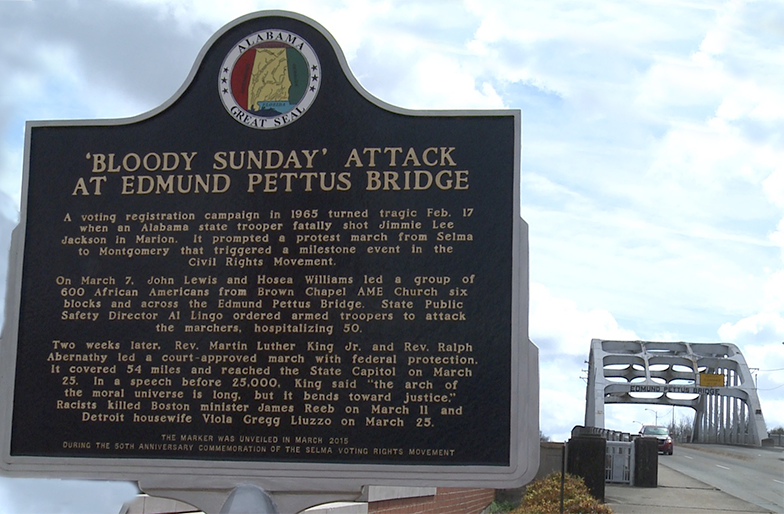
How challenging is it to hold on to the historical weight of “Bloody Sunday” in today’s climate?
In a world where grandmothers are in their 30’s and school children ONLY learn a black history one month a year in February. It is imperative that events like the Bridge Crossing Jubilee along with organizations such as Salute Selma are highlighted and shared throughout this country by media outlets such as Heart and Soul Magazines! With a country saturated in reality tv and video games we must continue being steadfast in creating outlets and opportunities for young and old to reflect and recommit to the many issues plaguing black and brown people. In our quest to “assimilate” many of our black upper and middle class are uncomfortable acknowledging and referring back to such a tragic time in our history which indeed makes our challenge great- yet we must never forget the importance of Selma, Alabama in this country’s Civil Rights narrative. This annual celebration, with its re-enactment of the historic Selma-to-Montgomery March, is a pilgrimage that every American should experience.
What can people expect to experience when attending Salute Selma’s Tribute to the 55th Anniversary of “Bloody Sunday” and the Selma to Montgomery March?
On the weekend of Friday February 28th through Monday March 2nd, 2020 there will be overwhelming grassroots energy where thousands will gather between Selma and Montgomery Alabama with some of the most dynamic leaders of this time-period sharing a platform to inform and educate through messages to move us forward. 2020 will be an important election year for this country especially with election day being just days away! This will be just the push we need to defeat the political machine that is literally destroying the democracy of this country! Over the years, millions of freedom loving people have flocked to Selma to hear the personal stories from surviving freedom fighters who were on that bridge in 1965. Salute Selma will kick off the weekend on Friday February 28th, 2020 in Montgomery Al with a Celebrity Golf Tournament, followed by a Salute Selma’s Empowerment Summit also in Montgomery on Saturday February 29th. where athletes, celebrities, politicians and entertainers will join us to discuss solutions to the grave challenges facing us both new and old. The weekend will culminate on Sunday March 1st in Selma with worship services attended by some of America’s most powerful people and history makers in the re-enactment Bloody Sunday and the historic crossing of the Edmund Pettus Bridge. “Bloody Sunday” shook the consciousness of the nation and the world, which fostered the enactment of the Voting Rights Act of 1965. On Monday March 2nd Salute Selma will host a GOTV caravan from Selma to Montgomery to galvanize and energize the community and ensure that all citizens remember those who sacrificed their lives on that very soil so that we could participate in the democratic process and have our voices heard as we go to the polls and cast our vote in an election that is clearly the most important one of our life time that could possibly threatened democracy throughout America.
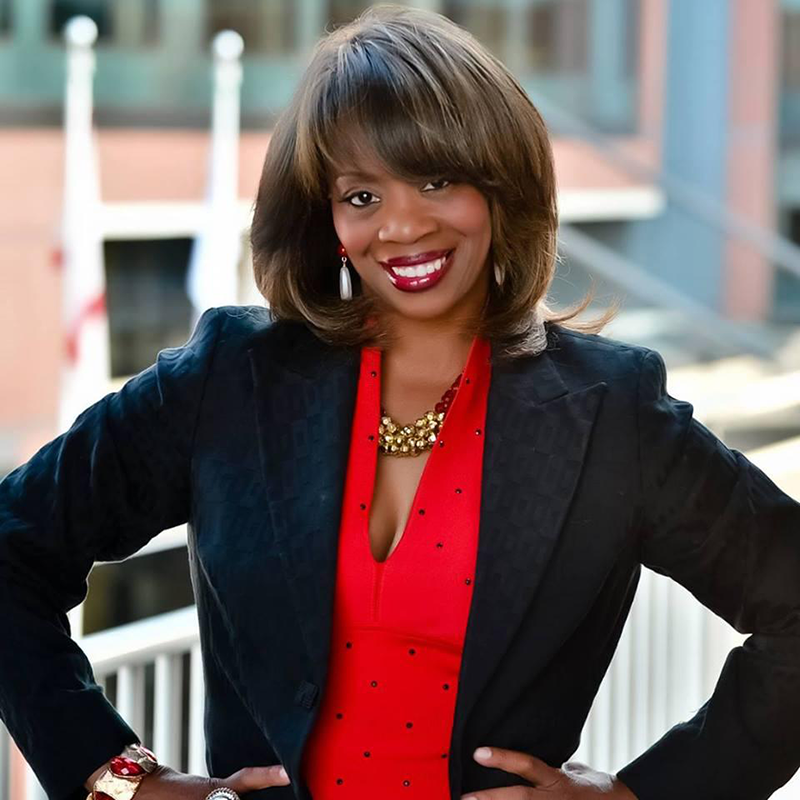
How can we mobilize more African Americans to become active with social justice issues?
I think we need to become very efficient in three things that will help to keep our community active and engaged in social justice issues.
1) We need to assess what are the current needs of the community. People want to know that you’re concerned about them and their personal issues. What’s in it for me… They want to see those issues being addressed immediately along with having contact with you regularly to raise issues as necessary. One of the best ways to accomplish this goal is by consistent contact with our community.
2) Year-round engagement is a must in our community. People don’t want to feel used or only seen as something important during an election cycle. We need to mobilize people and keep them actively engaged the entire time. So, we need to use technology, political strategies, and tactics to create year-round engagement to stay connected with them at all times.
3) We need to create a culture and develop mindsets around equality and fairness. Social Justice is a lifestyle, not a hobby that you pull out when you’re displeased. We need more people to live their lives on the value and principals of social justices. This way, we will have more people equipped to advance the movement of Social Justice and always be armed and ready!
How do you view/process racism today?
When discussing my view of racism allow me to quote the New York Times best-selling author, Mychal Denzel Smith, “We delude ourselves into thinking that, with time, things are better. Insomuch as we’re willing to admit that racism is still a problem today, we conclude that it will no longer be such once older generations die off. At our peril, we ignore how invested we have become in those racist institutions those older generations created. It’s not just a matter of changing attitudes about skin color. We have to be willing to challenge systems of power. So long as we’re caught up in celebrating our “progress,” we neglect the opportunity to do the necessary work required to actually uproot racism and white supremacy.”
How do you propose we build a better line of communication between civil rights leaders and millennials?
Millennials aren’t blind followers. If it is a cause worth fighting for they’ll be at the forefront but to build the bridge between civil right leaders and millennials there must first be transparency and honesty. Millennials are the generation of “why” and they want to know why things are the way they are and what must be done to make them better…Millennials are the generation of change and transparency. In these discussions with my co-founder Abina Billups, a quasa millennial, she feels that most of our civil rights leaders are grounded within the black church and to millennials, specifically millennials of color, the black church has lost its moral authority in many respects. Millennials are more accepting of individualism and are motivated by a sort of hands-off collaboration where they expect to have many mentors and like to learn through trial and error- not through the dictatorship principle of “do it because I said so”. Millennials want leaders who are selfless and actually put the needs of others first. While they respect past leaders such as MLK, Rosa Parks, and Malcolm X and what they did to advance collective issues and causes, they are frustrated with current civil rights leaders and see them blinded as by recognition and conflict; they feel that they lack vision for current communities which is very different from the 50s, and 60s. We need to get back to public servant politics, where we are inclusive and giving millennials a seat at the table! We must address the issues that are prevelant and important to them like student loan debt, environmental issues, the LGBT community and the legalization of marijuana. We have to move past the dark ages and accept that they will not live forever, and these are tomorrows leaders!

Where are black women and politics today?
Congresswoman Shirley Chisholm once said, “At present, our country needs women’s idealism and determination, perhaps more in politics than anywhere else.” This statement rings true today, as Black women remain on the front lines for social progress in the 21st century. Black women — both in and out of elected office, from the streets of Ferguson with Black Lives Matter to the “Me Too” movement and beyond — have advocated and agitated for social change that addresses the disempowerment of the Black community and the invisibility of women there. In 2008 Idealism such as this is what led me to create Women of Will (WOW) an Alabama based organization where we trained women to run for political office and in response to the Me Too Movement in 2018, Women United Now where I believe it’s time to demand the respect of our male counterparts and hold them accountable for sexually assault and exploitation. Black Women have made considerable strides; not only have we expanded power on the ballot but we’ve also leveraged our power at the ballot box. Black women have registered and voted at higher rates than male counterparts in every election since 1998. Moreover, we’ve surpassed all other race and gender subgroups in voter turnout. We are the number one voters in this country! Black female voters helped Doug Jones pull off an upset in Alabamain 2017, making him the state’s first Democratic senator in 25 years. We helped Democratic gubernatorial candidates Stacey Abrams in Georgia and Andrew Gillum in Florida come close to victory last year. We backed female candidates of color who made this Congress the most diverse in history. Harnessing power by tying votes to policy demands and priorities is ensuring Black women’s voices will not only be heard but is moving us further to the center of today’s political debate.
What has been your most proud moment/experience?
One of my proudest moments was watching BET/Centric’s premiere of the Salute Selma documentary and docu-concert where drones showed over 250,000 people from all across the world marching across the Edmond Pettus Bridge to honor and commemorate the 50th Anniversary of the Selma to Montgomery March and “Bloody Sunday” that led to the passage 1965 voting right act. One of my most moving experiences outside of the birth of my three sons: Kenneth, Kenyan and Kemari Carter was attending the first inauguration of Barack Obama who was elected the 44th President of the United States of America and the first African American to hold the office of commander and chief. I realize this was special day for most black folk but understand that I was all about ‘girl power” and dreamed of a day where a woman would lead this nation. In retrospect, It was probably beyond my comprehension that a black man could even make the ballot so it was with a little disappointment that I attended the event where we were greeted by the coldest weather and the biggest crowd I had ever experienced (well over a million people). Yet as I stood there and watched him being sworn in, I was suddenly overwhelmed by emotion: In that moment I felt the spirits of our ancestors who died in the middle passage and those who survived only to be beaten, raped, lynched and castrated. I felt the pain of the mothers whose children had been snatched from their bosom, families separated, legacies destroyed. I heard the prayers of Fredrick Douglas, Fannie Lou Hammer, Sojourner Truth, Harriot Tubman, Martin, Malcolm and millions of others who fought and died for a day where black people would be treated as human beings and not slaves. I began sobbing and was overwhelmed with an emotion I can yet describe.
How important is it for African Americans to vote and why?
We must never forget the dedication,
passion and courageousness that were paramount in the struggle of African-Americans
to achieve the right to vote in this country.
I
grew up in Selma, Alabama. I realized at a very young age; the debt paid
by our people for African Americans’ right to vote in this country. We
owe Selma a great debt! It is extremely important for me as a daughter of
Selma that everyone exercise this right and not allow those sacrifices to go in
vain. We owe them and that’s why it is important for us to support
entities like
Salute Selma to give those who were on that bridge a return on their investment
by educating the next generation on what was done for them and future
generations to come. That return includes voting for the advancement of
our community. We must understand that EVERYTHINNG is political: Where you
live, where you work, where you’re
educated down to what you eat and inhale are all political and begins with you exercising
your voting rights! If you vote in people
that are looking out for the best interest of our communities, our overall
livelihoods; they have the power to literally change your life and the fabric
of this country. But if you allow others to be at the table and control the
narrative we will always be living as second class citizens.
How much progress has been made for African Americans since the civil rights movement?
I think the protest politics that came out of the civil rights movement helped to change the landscape of America as we see it today. We’ve had many firsts, mind-blowing advances. Yes we’re doing better than chattel slavery. Yes we’re doing better than legal segregation with “white only” signs. But what material benefit do we get from the comparison? Some of our present challenges are that we are still so focused on the protest that we have not put our focus in economic empowerment. So, there has been substantial progress- it has to be measured narrowly, and I’m hopeful that we shift our message and move from the past and build based on today’s realities: Unemployment, miseducation, mass incarceration, racial profiling, women’s rights, and a host of other problems are just as prevelant today as it was yesterday and it some cases worse.
Catrena Norris Carter National Coordinator/Co-Founder of Salute Selma Inc. along with my co-founder Abinda D. Billups. Visit our website www.saluteselma.org.
I am also Founder and President of Women United Now. We Fight for women who are victims of sexual predators by holding, not just the perpetrators accountable but also the boards, institutions and corporations! Check out the website at www.womenunitednow.org. You can also follow us on Facebook and twitter @womenunitednow for more details.



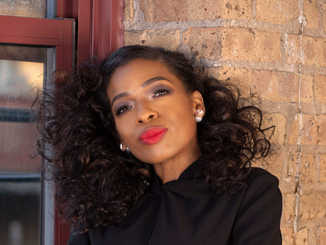

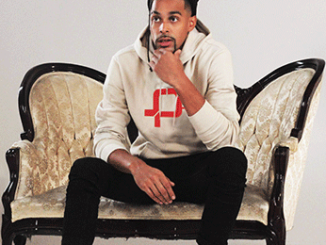
Be the first to comment